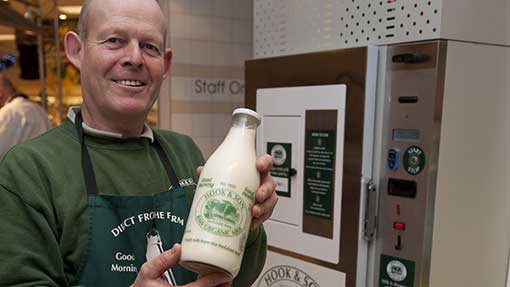Food Standards Agency reviews raw milk sales rules

Dairy farmers could carry on selling raw milk direct to customers, as well as over the internet and from their own vending machines, under proposals from the Food Standards Agency.
The government watchdog has launched a consultation as part of its review of the sales and marketing rules for unpasteurised milk and cream in England, Wales and Northern Ireland.
Currently farmers can sell raw milk straight off the farm, at a farmers’ market, through a farm catering operation or from a milk float.
The FSA’s preferred option is to keep the same rules, but publish guidance on what the law covers and clarify wording on labels.
This would let farmers reach consumers through internet sales and vending machines on the farm or in rented shop-space, but not in wider retail.
East Sussex farmer and star of The Moo Man documentary Steve Hook sells 350,000 litres of raw milk a year, much of it over the internet.
Last year the FSA tried to prosecute Mr Hook for selling raw milk through a vending machine at Selfridges in London, but later dropped the case.
“I am personally happy with the law the way it is,” he said. “The FSA has done a good job.”
“I’m thrilled that they have okayed the internet service. We view the internet deliveries as the most controlled way we sell our milk.
“I am disappointed the FSA has not allowed farmers to market via retailers’ vending machines. Farmers generally do not have time to market their products; machines do.”
The FSA’s consultation runs until 30 April and opinions can be emailed to RDM@foodstandards.gsi.gov.uk or aired at a public meeting that will be arranged.
The other proposals in the consultation are to force all milk to be pasteurised before sale, to allow the raw milk sales from all outlets or to do nothing.
“Our preferred approach therefore seeks to strike the right balance between allowing consumer choice and protecting public health,” said FSA head of policy Steve Wearne.
“The new routes of sale that have emerged during the past few years have tested the interpretations of the current regulations and where it is acceptable to sell raw milk.
“We do not believe the regulations need changing, but businesses and those who enforce the rules need greater clarity on what is acceptable.“
